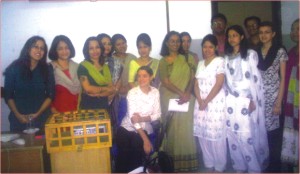Feature
Nell Freudenberger

By Afrina Choudhury
 It's not that easy for everyone to become a writer considering Nell Freudenberger's credentials. She has it all, from a bachelors degree from Harvard to a Masters degree in fiction writing from New York University and even experience from working at the New Yorker magazine. Her collection of short stories Lucky Girls and her New York Times notable book The Dissident won her the Pen/Faulkner Malamud award for short fiction and the Whiting Writer's award. She also received the Sue Kaufman Prize from the American Academy of Arts and Letters. Her stories have been published in the New Yorker, The Paris Review, Granta and The Best American Short Stories, 2004. Now isn't that something and it isn't any wonder that she's so successful! However don't let your hopes down because Freudenberger provided some of the unique secrets of her trade which I shall disclose for all you aspiring writers out there. It's not that easy for everyone to become a writer considering Nell Freudenberger's credentials. She has it all, from a bachelors degree from Harvard to a Masters degree in fiction writing from New York University and even experience from working at the New Yorker magazine. Her collection of short stories Lucky Girls and her New York Times notable book The Dissident won her the Pen/Faulkner Malamud award for short fiction and the Whiting Writer's award. She also received the Sue Kaufman Prize from the American Academy of Arts and Letters. Her stories have been published in the New Yorker, The Paris Review, Granta and The Best American Short Stories, 2004. Now isn't that something and it isn't any wonder that she's so successful! However don't let your hopes down because Freudenberger provided some of the unique secrets of her trade which I shall disclose for all you aspiring writers out there.
BRAC University students had the honour of meeting this amazing writer on the 26th of February at the university campus. The Department of English and Humanities with the help of the American Consul arranged the meeting. The meeting was called “How I became a writer” but Freudenberger preferred it to be “What is your impression?”
She believes that impressions are the most important factor in writing because you cannot write unless you form an impression of someone or something and thus perceive it in a certain way. Everyone forms ideas about something which again leads to misinterpreting and misunderstanding. It is this area which Freudenberger is interested in, the various misleading impressions that people have of one another, especially people of different countries and races. She was influenced by Rabindranath Tagore in this respect because Tagore also said once on a visit to Canada that such a short visit did not goive him the right to comment on the place because we usually misunderstand and fail to perceive new surroundings.
Freudenberger also believes that you cannot write about something which you haven't felt or experienced and so she endows those feelings and experiences into her characters. She tries to enter the mind, heart and skin of the person, whoever he is and wherever he is from. So in order to gather feelings, traveling is the way to set yourself as a writer, a “way of sharpening your senses” and thus getting to know, perceive and gain impressions of people and learning what impression they have of you. In this manner you get to perceive your own country in a different light and not take it for granted. As she lives in an insular country, in order to receive an accurate idea of what it is to be an American, she needed to see what others think.
At par with her beliefs, Freudenberger has traveled to various Asian countries and thus gathered the setting and experiences necessary for her book. After her graduation she didn't take up the posh jobs her parents were hoping she'd take but rather spent a year teaching English in a government school in Bangkok and later on in the Deepalaya NGO in New Delhi. When her publishers asked her to write about the places she visited she felt that India is too big to write about so she decided to write about experiences there. She felt India belongs to writers like Rushdie and V.S. Naipal (Naipal is one of her favourite authors). Thus Lucky Girls consists of short stories about young women who leave their homes and try to cope with new and unfamiliar surroundings and ofcourse the impressions they gather. Similarly, The Dissident is about a Chinese artist who comes to America and tries to become someone else.
Nell Freudenberger was also very careful not to exotocize, exaggerate or patronize the countries shes used as settings. She didn't write about anything she didn't know and even read her first book to an Indian audience. Her comment that they are “too forgiving sometimes.”
Now you may be wondering how she came to be in Bangladesh. Well she came here with a Bangladeshi friend in the hope of visiting Sundarbans after reading about it in an Amitav Ghosh novel. She finds Bangladesh very welcoming and the people very hospitable who are not afraid to share their opinions. She was especially touched by her friends family who accepted her as their own daughter. She even learnt two Bengali expressions, khub moja and dorkar nai. She loves the interior of her friends hiome, the small details like the frames on the wall, the kitchen, etc which formed quite an impression on her mind. Maybe she will write a book on Bangladesh one day, who knows?
Oh and she doesn't believe in writers block. She thinks its an indulgence. If you cant think of anything, go on sitting there or just write anything because most writers think their writing is trash till it turns out to be a master piece. So please, all of you writers, never give up.
| 